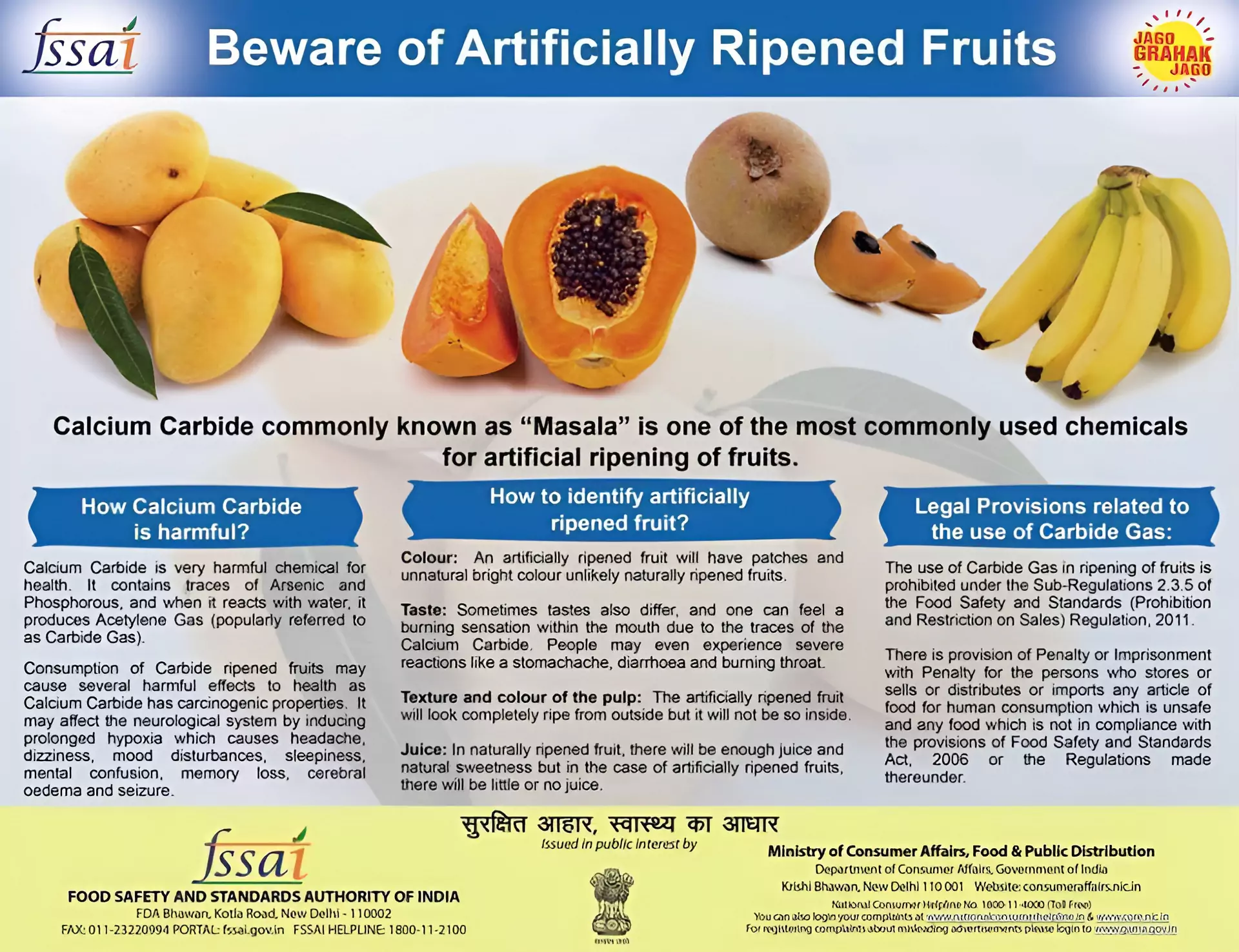Context
Recently, the FSSAI has published a comprehensive guidance document titled “Artificial Ripening of Fruits- Ethylene gas a safe fruit ripener” suggesting the Food Business Operators to follow the procedure for artificial ripening of fruits.
FSSAI Warns Against Use of Calcium Carbide for Ripening
- Action against Violators: FSSAI is also advising Food Safety Departments of States /UTs to remain vigilant and take serious action and deal stringently against person(s) indulging in such unlawful practices as per the provisions of FSS Act, 2006 and Rules/Regulations made thereunder.
- Further, the Central Insecticides Board and Registration Committee (CIB & RC) has approved Ethephon 39% SL for the uniform ripening of mangoes and other fruits.
Enroll now for UPSC Online Course
About Calcium Carbide

- Manufacturing: It is produced by heating lime and carbon mixture to 2000-2100°C in an electric arc furnace.
- Use: It is commonly used for ripening fruits like mangoes.
- Concern: It releases acetylene gas which contains harmful traces of arsenic and phosphorus.
- These harmful substances, also known as ‘Masala’, can cause serious health issues such as dizziness, frequent thirst, irritation, weakness, difficulty in swallowing, vomiting and skin ulcers, etc.
- Acetylene gas is also equally hazardous to those handling it. There are chances that calcium carbide may come in direct contact with fruits during application and leave residues of arsenic and phosphorus on fruits.
- Regulations by the FSSAI:
- Ban: Due to these dangers, the use of calcium carbide for ripening fruits has been banned under Regulation 2.3.5 of the Food Safety and Standards (Prohibition and Restrictions on Sales) Regulations, 2011.
- Permitted Safety Limits: Considering the issue of rampant use of banned calcium carbide, FSSAI has permitted the use of ethylene gas as a safer alternative for fruit ripening in India.
- Ethylene gas can be used at concentrations up to 100 ppm (100 μl/L), depending upon the crop, variety and maturity.
About Central Insecticides Board & Registration Committee:
- Establishment: It was set up by the Ministry of Agriculture and Farmers Welfare in 1970 to regulate the import, manufacture, sale, transport, distribution and use of insecticides.
- The insecticides are regulated under Insecticides Act, 1968 and Insecticides Rules, 1971.
- Mandate: The Central Insecticides Board and Registration Committee is responsible to advise the Central and State governments on technical matters related to insecticides.
About Above Mentioned Gases:
- Ethylene: It is a naturally occurring hormone in fruits, regulates the ripening process by initiating and controlling a series of chemical and biochemical activities.
- The treatment of unripe fruits with ethylene gas triggers the natural ripening process until the fruit itself starts producing ethylene in substantial quantities.
- Ethephon: It is a plant growth regulator used to promote fruit ripening, abscission, flower induction, and other responses.
- Acetylene: It is also called ethyne. It is a colorless gas which is used as a chemical building block widely and also as a fuel.
|
![]() 21 May 2024
21 May 2024
